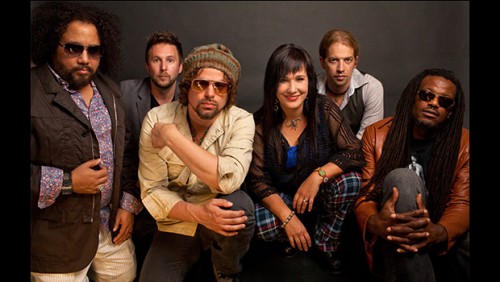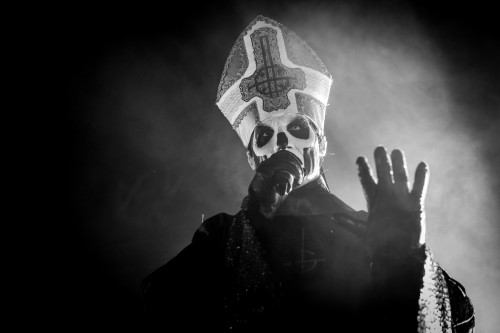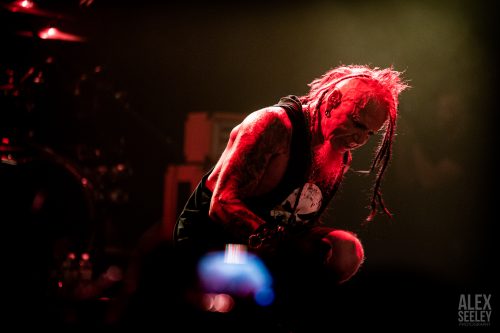By Michael Lester
Michael Glabicki first discovered he had a voice for music back in the mid-1980s when he randomly and playfully lent his distinctive vocal chords to a version of the Rolling Stones’ “Can’t Always Get What You Want” while a band performed at a high school party.
“I was joking around,” recalled the Pittsburgh native and frontman for Rusted Root, who turns 45 on Jan. 22. “Everybody looked at me, and they were like, ‘What the hell just happened?’ It was the first time I knew I had something.”
Glabicki brings his unmistakable voice, the one that makes yodeling sound macho, to the Sherman Theater Sunday night along with his percussion-heavy sextet that has evolved and survived multiple lineup changes over two decades.
Sunday’s show, Rusted Root’s latest stop to promote its new album “The Movement,” was rescheduled from an early December date at the intimate downtown Stroudsburg venue that Glabicki described as having a “neat vibe to it, a classic feel.”
“‘The Movement’ is an extremely joyous recording with seriously deep undertones,” says Glabicki, who owns his own Pittsburgh recording studio, Red Cloud. “It is a culmination of everything we have learned, or have tried to learn, over our entire career. It truly is a career record for us.”
Rusted Root’s seventh studio album is also an intimate collaboration between the band and its loyal fans. The band funded the album through its “Fortunate Freaks” social media fundraising campaign. Root followers contributed about $30,000 toward its production.
“We did it all on our own. In Pittsburgh,” Glabicki said proudly. “It was a fun experience. A different way to connect with fans and to be creative. Fans came into the studio for a day. Their hand claps got to be on the record.”
Unsuccessfully searching for words to describe Glabicki’s voice, we deferred to the man himself when Glabicki spoke to Highway 81 Revisited by phone from his Pittsburgh home during a recent tour break.
“It just does what it does,” Glabicki replied, in a less-than-helpful response.
Rusted Root likewise continues to do what it’s done since its early 1990s formation after Glabicki’s short-lived enrollment at La Roche College in Pittsburgh.
Glabicki said the band’s roots were planted during his trip to Nicaragua as a 17-year-old at the height of the Iran Contra scandal.
“I was politically active in high school,” Glabicki recalled. “I went to Central America to witness what was happening as opposed to hearing in the media what was happening. The Contra war was happening. The U.S. was backing the Contras. (The U.S. was) essentially a terrorist organization.
“It made me cynical as far as the media and the misinformation being thrown around. I came back wanting to make change. It made sense to me to play music.”
When he arrived home and enrolled in college, Glabicki, who had owned a guitar and dabbled with the instrument since the age of 9, began writing songs as sort of a therapeutic release from human rights abuses he had learned about first-hand in Central America.
“Ecstasy,” a frequent Rusted Root concert closer, is perhaps the most notable song in the Rusted Root catalog spawned from Glabicki’s Nicaraguan excursion.
“That’s where it first made sense to me, this connection between my voice and song writing,” Glabicki said, “and being able to heal. It felt good. It was not knowing what I wanted to do in life. And being a little depressed over the trip to Nicaragua, depressed about all the tragedy that was going on down there.”
While experimenting musically on his own, Glabicki decided to drop out of college and start a band. He first sought out high school friend Liz Berlin, whom he had first met a political rally. Glabicki, Berlin — a vocalist-percussionist — and bassist Patrick Norman form Rusted Root’s nucleus, founding members of the band who have remained all these years later. The remaining ensemble has continued to evolve, most recently with Preach Freedom on drums and Colter Harper and Dirk Miller on guitar.
So too has Glabicki’s life since his impromptu performance at that high school party. Rusted Root, which has released eight albums, went gone on to sell millions of records, including the 1998 self-titled studio album, “Rusted Root,” which included a cover of the Mick Jagger/Keith Richards-penned classic “Can’t Always Get What You Want.”
The band has shared concert bills with the likes of the Grateful Dead, Dave Matthews Band, Robert Plant and Jimmy Page, and Santana.
Rusted Root’s signature song, “Send Me on My Way,” which charted in the Billboard Hot 100 in 1995, remains a commercial success for the band nearly 20 years after its release. The band has sold the song for movie soundtracks and TV programs.
The band’s music has appeared in movies like “Ice Age,” “Twister” and “Matilda” and TV shows like “New Girl,” “Ally McBeal” and “Charmed.” “Send Me on My Way” has most recently surfaced in an Enterprise rental car commercial.
Glabicki, who plans to release a solo album some time this year, said the band hasn’t felt much fan backlash over the Enterprise spot.
“I was curious to see if we would get any,” Glabicki acknowledged. “It’s a pretty positive commercial. It doesn’t impact the meaning of the song. We couldn’t’ see how anybody would have a problem with it. We like the company. Obviously, we see the commercials a lot.”
Glabicki is also a single dad. His 16-year-old son Quinn is an aspiring photographer and filmmaker who has joined Rusted Root on tour to document its life on the road.
“It’s been awesome. It’s been exhausting. It’s been uplifting,” Glabicki says of his Rusted Root career. It’s a learning experience. Over 23 years, people come and go. Right now, we’re at our best.”




Leave a Reply